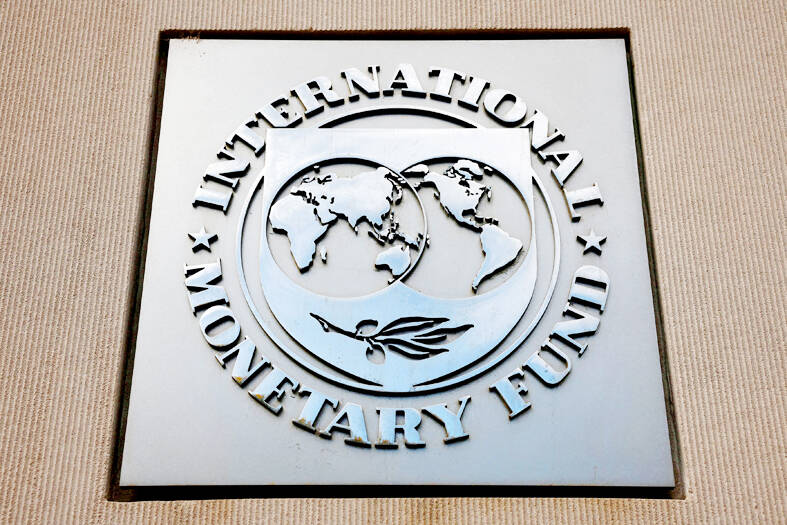The US House of Representatives’ Committee on Financial Services on Thursday approved a bipartisan bill to support Taiwan’s admission into the IMF.
The bill, introduced by Republican Representative Young Kim and her Democratic counterpart, Al Green last month, calls for the US government to support Taiwan’s admission into the IMF as a member, and participation in the financial institution’s regular surveillance activities relating to its economic and financial policies.
In addition, the bill urges the US government to support IMF employment opportunities for Taiwanese nationals, and for Taiwan to receive IMF technical assistance and training.

Photo: REUTERS
Before the bill passed, Kim said that the US had long supported Taiwan’s inclusion in international organizations and advocated for a mechanism to ensure its voice is heard when full membership is not possible.
“This principle has endured for decades across the Republican and Democratic administrations and has repeatedly been reaffirmed in bills passed by this Congress,” Kim said.
“My bill is straightforward. It requires the Treasury Department to implement our Taiwan policy at the international financial fund or the IMF. As the legislation makes it clear, Taiwan is not required to be a member of the United Nations to gain membership in the IMF,” Kim added.
Kim cited Kosovo as an example, saying the country is not a member of the UN, but has been an IMF member for more than a decade.
She said it would be “absurd” for the organization to exclude Taiwan, one of the US’ top 10 trade partners and the fifth-largest foreign exchange reserve holder in the world.
“At a time when China has been threatening the work of the IMF through its non-transparent lending abroad and its lack of cooperation with other creditors, we must focus the fund on effective international cooperation,” Kim said.
“That means openness toward potential members like Taiwan that can make significant contributions to the IMF’s mission,” she added.
Kim said the push for Taiwan to join the IMF could pave the way for it to join other international financial institutions, such as the World Bank, which requires countries to be members of the IMF before they can join.
She added that the US Senate Committee on Foreign Relations has voiced its bipartisan support for Taiwan’s membership in the Inter-American Development Bank, which would be possible if Taiwan was an IMF member.
The bill states that although Taiwan is not an IMF member, it has membership in the WTO, the Asian Development Bank and APEC.
The bill cited the Taiwan Relations Act as saying: “Nothing in this act may be construed as a basis for supporting the exclusion or expulsion of Taiwan from continued membership in any international financial institution or any other international organization.”
Taiwan retained its IMF membership for nine years after it lost its seat in the UN to the People’s Republic of China (PRC).
Even after the PRC replaced Taiwan as an IMF member in 1980, the 16 Taiwanese employed by the IMF were allowed to continue working there.
The IMF, which has 191 members, promotes global financial stability and economic growth by providing financial assistance, policy advice and economic surveillance to members.

US President Donald Trump yesterday announced sweeping "reciprocal tariffs" on US trading partners, including a 32 percent tax on goods from Taiwan that is set to take effect on Wednesday. At a Rose Garden event, Trump declared a 10 percent baseline tax on imports from all countries, with the White House saying it would take effect on Saturday. Countries with larger trade surpluses with the US would face higher duties beginning on Wednesday, including Taiwan (32 percent), China (34 percent), Japan (24 percent), South Korea (25 percent), Vietnam (46 percent) and Thailand (36 percent). Canada and Mexico, the two largest US trading

China's military today said it began joint army, navy and rocket force exercises around Taiwan to "serve as a stern warning and powerful deterrent against Taiwanese independence," calling President William Lai (賴清德) a "parasite." The exercises come after Lai called Beijing a "foreign hostile force" last month. More than 10 Chinese military ships approached close to Taiwan's 24 nautical mile (44.4km) contiguous zone this morning and Taiwan sent its own warships to respond, two senior Taiwanese officials said. Taiwan has not yet detected any live fire by the Chinese military so far, one of the officials said. The drills took place after US Secretary

CHIP EXCEPTION: An official said that an exception for Taiwanese semiconductors would have a limited effect, as most are packaged in third nations before being sold The Executive Yuan yesterday decried US President Donald Trump’s 32 percent tariff on Taiwanese goods announced hours earlier as “unfair,” saying it would lodge a representation with Washington. The Cabinet in a statement described the pledged US tariffs, expected to take effect on Wednesday next week, as “deeply unreasonable” and “highly regrettable.” Cabinet spokeswoman Michelle Lee (李慧芝) said that the government would “lodge a solemn representation” with the US Trade Representative and continue negotiating with Washington to “ensure the interests of our nation and industries.” Trump at a news conference in Washington on Wednesday announced a 10 percent baseline tariff on most goods

THUGGISH BEHAVIOR: Encouraging people to report independence supporters is another intimidation tactic that threatens cross-strait peace, the state department said China setting up an online system for reporting “Taiwanese independence” advocates is an “irresponsible and reprehensible” act, a US government spokesperson said on Friday. “China’s call for private individuals to report on alleged ‘persecution or suppression’ by supposed ‘Taiwan independence henchmen and accomplices’ is irresponsible and reprehensible,” an unnamed US Department of State spokesperson told the Central News Agency in an e-mail. The move is part of Beijing’s “intimidation campaign” against Taiwan and its supporters, and is “threatening free speech around the world, destabilizing the Indo-Pacific region, and deliberately eroding the cross-strait status quo,” the spokesperson said. The Chinese Communist Party’s “threats